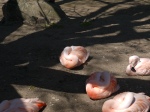There are many resources for au pairs who have just arrived to the US, and are dealing with culture shock. Culture shock is “the personal disorientation a person may feel when experiencing an unfamiliar way of life due to immigrating or visiting a new country”. Summer Blackhurst, Go Au Pair’s Public Relations expert, wrote a series of great articles on the subject recently, including “Culture Shock: The Four Phases”, and “Cultural Adjustment Outcomes“. I highly recommend that all au pairs and their host families take a few minutes to read these articles as they contain some very intuitive information that may help a new au pair who may be experiencing culture shock as we speak.
But what about au pairs who are finishing up their placement year, or even their second year, and are getting ready to return home? Surprisingly, they may be experiencing the same type of nervousness about returning to their home surroundings as they did when they first arrived to the US. What was once familiar, is now foreign to them.
Dr. Lora Cook, founder of the au pair program “Learning to Live Your American Dream”, based out of National Louis University’s Chicago campus, talks about this fascinating issue in one of the sections of the popular program. “Au pairs usually come to the US expecting to feel culture-shock, but they don’t always go home expecting to experience reverse culture shock,” Dr. Cook told me. “We like to prepare students by helping them moderate their expectations when they return for either a visit or at the end of their au pair experience.”
Believe it or not, language can sometimes be an issue. When you are immersed in a language and have mastered that language, you start to dream and even think in that language. If an au pair’s native tongue is not English, she may have a difficult time having a conversation when she returns home. Finding the appropriate word for an object, for example, might take a few extra seconds because she may need to translate that word in her mind from English. But, just like mastering English took time, with practice and exposure, those language skills will return.
Getting used to the food again back home may be challenging as well. For the past year, the au pair has become accustomed to American food, restaurants, and large mega-grocery stores. Spices and available ingredients are probably different and may require getting used to again. Big city conveniences may not be readily available in the au pair’s home country. They may feel a sense of frustration by this.
The au pair might expect her relationship with her friends to be the same when she returns home, but may be disappointed to learn that her friends have moved on. Maybe they began studying at the university and have made new friends. Some of her friends may have even gotten married or started a family. Although the au pair has made many new friends, they are probably 1,000’s of miles away in the US or another country. The au pair has grown and changed as a person as well. She may not have the same interests as her friends. Feelings of isolation and depression are not uncommon.
The au pair is probably excited about her year abroad and is very happy to tell all of her friends and family about her adventures here in the US. To her disappointment, she may find that her friends aren’t really interested in hearing about her travels, and may even feel like she is “bragging”. Feelings of rejection is another common problem for au pairs when they return home.
The Peace Corps, who sends around 4,000 volunteers each year abroad actually has a program to help prepare their volunteers for re-entry into American culture. In an article published by CNN.com, Jodi Hammer, Coordinator for returned Peace Corps Volunteers, offers some great advice that au pairs should consider:
- Be prepared. One of the best ways to avert reverse culture shock is just simply acknowledging that it is real and expected.
- Share your experiences (with caution). It’s okay to talk about your adventure, but find a way to do so in a way that does not sound pretentious. ( I read an article written by a woman who had spent a year in Thailand on a fellowship. She has a very unique pair of earrings that she purchased at a local market. When she wears them, people always ask her where she purchased them, and it gives her the opportunity to tell her story in an unobtrusive way. )
- Stay connected. The internet is a marvelous thing! It’s very easy for au pairs to stay connected to their international friends when they return home. Communicating with other former au pairs who may be experiencing some of the same feelings is very helpful.
- Accept that you’ve changed. Dr. Cook also offers this advice and added that au pairs should “accept that some of your relationships may be different and you may not be as close to some people as you were before, but just like you developed many new relationships during your time in the US, you can do the same back at home.”
Dr. Cook added one final piece of advice for au pairs. “Remember that time almost always makes things easier. So be patient, and you will eventually find your new path back at home just as you did in the US!”


































